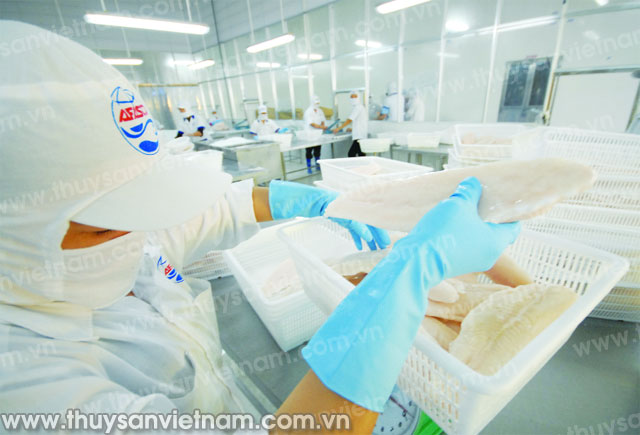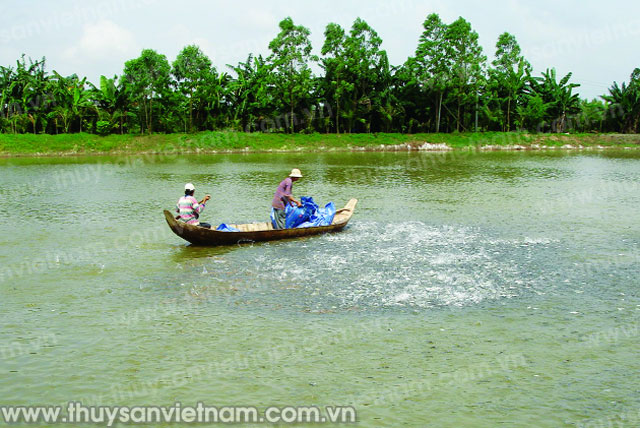Many experts believe that fish farmers are gradually losing competitive advantage as more and more exporting and processing businesses take the initiative to expand the material areas…. Accordingly, to keep “playing field” for themselves, small farming households need to have appropriate direction.
“Grabbing” enterprises
Previously, during the “golden age” of farming and processing Tra fish for export, the role of parties in commodity chains of Tra fish was clearly fixed (farmers raised fish, enterprises processed and found the export markets). In recent years since the Tra fish industry “went downhill”, the tendency to form a closed production line of businesses was more and more rapidly increasing, gradually removing farmers from “the play”.

More and more exporting and processing bussinesses take the initiative to expand the material areas – Photo: Le Hoang Vu
According to a report by the Ministry of Agriculture and Rural Development, in 2011, the strong shift of the processing enterprises was acknowledged. Most of them built their own supplies, some had their own material suplly of 60 – 70 percent of processing capacity. At mid-2013, the Ministry of Agriculture and Rural Development reported: “Now enterprises have their own farming area estimated at 60 percent of the total farming area of Mekong Delta mainly because some businesses have the potential to increase investment in open extensive material areas (by hiring the ponds from farmers or investing in buiding the own area) and take advantage to buy inputs such as fee and medicine with the discount of 8 – 10 percent”.
In fact, according to the fisheries association of Dong Thap province (which has the largest fish area in the country) the province has 1,939 ha in which the farming area of 41 businesses accounts for more 66 percent. Farmers associating to businesses in the form of outsourcing production account for 11 percent and independent farmers, 23 percent. The association said that the farming area of processing businesses continues increasing and is gradually completed, forming a closed chain from the step of production of feed, breeds, and commercial product raising to the exports and by product one (fish flour, fish oil, collagen…) in order to optimize profits. Meanwhile, the area of individual farmers is gradually shrinking and the “pond hanging” area is expanding.
Similarly, in An Giang, the provincial fisheries association said that in 2013 the total area of Tra fish farming in the province was 1,296 ha, in which the area of Tra fish farming moving to other objects must 9.45 ha, “pond hanging” 85.15 ha, business linking farmers 44,82 ha, outsourcing farming with enterprises 3.85 ha.
| >> Tran Anh Dung, vice-director of the An Giang Fisheries Association said: “There should be solutions on how to shrink the Tra fish area of businesses by bank leverage”. |
Tran Anh Dung, Director of the An Giang Fisheries Department, said that over recent years the area of Tra fish farming has drastically decreased, many Tra fish farmers have left “the play field” due to accumulating difficulties. Up to the end of February 2014, the area of Tra fish farming throughout the province was about 830 ha, in which the farming area of 24 enterprises was 600 ha, accounting for over 70 percent of the province’s Tra fish area.
“We can say that from 2008 to now, there has only been the place for large Tra fish farming households who have economic potentials, while most of small farming household have decreased” said Dung.
Farmers are always forced
Nguyen Van Ut, a Tra fish farmer in An Giang, said: “In the past time, farmers faced many difficulties signing business contracts, the payment for fish was after one month, but usually after 3 – 5 months or even longer.”
“I have been selling fish for a business since Tet holiday, but I have just received 50 percent of the total money and I have not known when be paid will be paid,” added Ut.
The situation like Ut’s is quite common for Tra fish farmers in the Mekong Delta. Chairman of the Chau Phu Farming Cooperative (An Giang), Nguyen Huu Nguyen said that many businesses have owed fish farmers for three years, but they do not know how to get back the money. Nguyen Ngoc Hai, director of Thoi An Cooperative (O Mon, Can Tho), added that in the fish selling contract, businesses commit to pay for farmers after 30 days, but mostly after many months, even a year. Thus, the more farmers raise Tra fish, the more they lose. Hai said: “Farmers who sold Tra fish to businesses only receive a contract in paper. Businesses paid late for many months or a year with the value of billions of VND. Farmers must pay a monthly interest for banks. It has happened for over 10 years, but farmers can do nothing”.
To explain the reason why the signed contracts fail to come into effect, Dung said that at the moment businesses do not sign early crop contracts with farmers, they just sign principle contracts for reference in the first stage. Only when they already buy fish from farmers, businesses sign the contracts with a specific price. However, these contracts are vaguely signed, for example, the payment time limit from businesses for farmers is after 30 days from the date of sales. In fact, three months is also after 30 days, and three years is after 30 days too. Thus, when there is a dispute, the contract is illegal and unfavorable to farmers. “The arbitrators of the Vietnam Chamber of Commerce and Industry once had to solve the problem but they failed because businesses had their own reasons. In fact, businesses do not want to sign the fish guarantee contracts with farmers at the beginning of the season and they just want to buy unguaranteed fish,” said Dung.

Tra fish farmers are gradually losing competitive advantage – Photo: Viet Anh
According to the provincial fisheries association, knowing that sales contracts which are made by businesses have unfavorable terms to farmers, farmers still accept to sign the contracts because they always think this is the only way they can sell fish. “Farmers always remain passive to sell fish. If they demand to make the contract legally, no businesses buy their fish,” said Le Chi Binh, deputy chairman of Association of An Giang Fisheries Farming and Processing.
Suffering losses in every way
At the workshop on buiding awareness of sustainable Tra fish production in the Mekong Delta on March 19, 2014, in Can Tho jointly held by the Vietnam Fisheries Society and the World Wide Fund for Nature in Vietnam (WWF-Vietnam), many participants raised questions: “Why don’t farmers do linking or outsourcing farming with enterprises to share profits and risks?”
Answering, Dung said that businesses and farmers have cooperated in two forms. Firstly, businesses give materials and receive products. Businesses provide captial for farmers at 3,300 – 5,000 VND/kg of finished products (depending on businesses). With the amount of money, farmers buy breeding fish, veterinary medicine, feed and hire labors and bear other costs. Besides, businesses will provide farmers with fishery feed (about 1.6 kg of feed/kg of fish). Secondly, businesses choose qualified farmers. Accordingly, farmers have to prepare breed fish, ponds untill fish weight tops 0.5 kg/fish. After that businesses will support farmers by investing in fish feed and buying fish at the market price. Due to the lack of capital at the fist stage, many farmers choose the first cooperation form in spite of less profit. However, Dung said that farmers are always on the defensive and suffer a lot of risks in the two forms.
Through discussion with outsourcing farmers, we can see that farmers have many difficulties, earning the profits which is 1/10 – 1/15 of those of plants, and outsourcing businesses (not including businesses benefiting from the use of this material for process and exports). “Because I have no capital, I do outsourcing farming for plants. Actually, I don’t want to do that foolishly,” said Tran Van Tan, a Tra fish farmer in Hong Ngu, Dong Thap.
To keep the “playing field”
More and more businesses heavily invest in the material area, which means that it is becoming more and more difficult for small farming households. General Secretary of VASEP Truong Dinh Hoe said that presently the self-sufficiency rate of input materials for the production of Tra fish processing and exporting businesses tops 70 percent and the trend is increasing. In contrast, the number of small farmers is drastically decreasing.
| >> Ngo Tien Chuong, Coodinator of Aquaculture Program of WWF-Vietnam, said: “ASC in group suitable to conditions of small Tra fish farmers is being considered before the announcement in September 2014. WWF-Vietnam will connect to the importers who support small-scale fish farmers with 50 percent of sustainable certification costs so that farmers can meet the standards”. |
However, according to Ngo Tien Chuong, Coordinator of Aquaculture Progam of WWF-Vietnam, no businesses always have enough resources to invest in building the material area. Currently, only most of big businesses actively prepare the material resources, and small and medium enterprises still have to rotate according to various sources (such as buying from farm or at the warehouse of plants with large farming areas…). Accordingly, small farmers can completely withstand with their profession and sustainably develop in the coming time if they know how to cooperate together in the form of cooperatives or cooperative groups. This will create a big enough supply of raw Tra fish to help farmers to get a better price.
With the same opinion, Thai An Lai, vice chairman of the Dong Thap Fisheries Association, said: “To save themselves, small farmers should join the cooperative groups, cooperate together to form a strong farming area. This will help them not only decide the selling price and avoid fluctuating fish prices but also approach ASC certification easilier, aiming at sustainable production development”.
“At present, Dong Thap is implementing the restructuring of Tra fish industry in which the province pilots the establishment of three cooperatives, including small Tra fish farmers in Chau Thanh and along with businesses without their own material area. This production model also helps fish farmers buy input materials (feed, breed, veterinary medicine…) with low price, implement safety production standards more conveniently, have a good position in the negotiation with businesses and approach bank loans with ease,” added Lai.
| >> Deputy Minister of Agriculture and Rural Development Vu Van Tam: “The Mekong Delta is favored by nature in Tra fish farming. Farmers are entiled to enjoy the profit. Currently, some businesses should not have thoughts of usurping farming areas. The Vietnam Pangasius Association needs to have a correct direction”. |